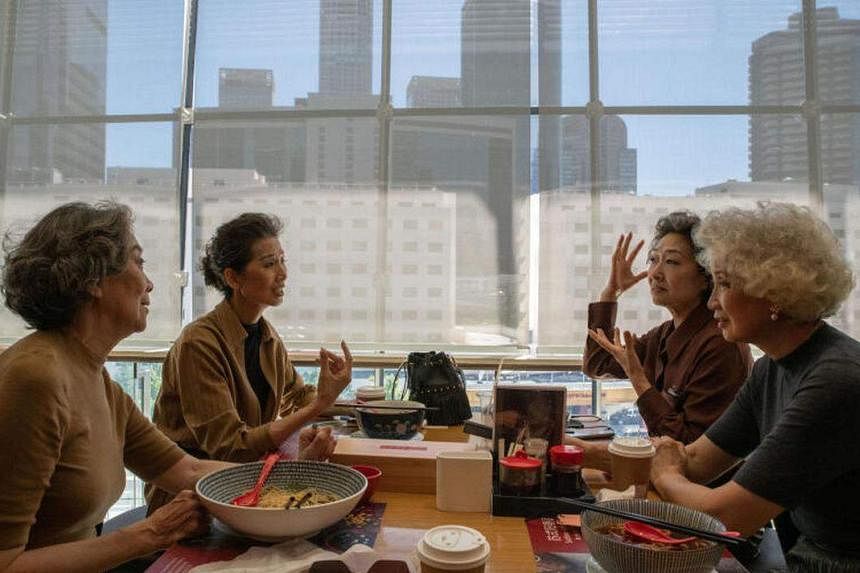HONG KONG – The 65-year-old woman crouches in a field and holds up a head of cabbage. Behind her, two friends sway back and forth, cucumber and radish in their hands.
“This rotten cabbage, let’s pull it out, eat it, achieve some foodie freedom,” Ms Guo Yifen, the woman with the cabbage, raps in a low and creaky voice in the song Spicy Hot Pot Real Rap.
The trio, known as Sister Wang Is Coming, are known for sharing playful videos on Douyin, the Chinese version of TikTok.
Ms Guo and her musical partners, Ms Wang Shuping, 64, and Ms Wang Xiurong, 66, have more than half a million followers who watch their food-related music videos, featuring jams such as Fried Mushrooms and Country Food Rap.
The group is part of a growing number of older Chinese who have found viral success sharing their daily lives online. In this corner of the Chinese Internet, octogenarians croon, septuagenarians tango and grey-haired fashionistas strut down catwalks and offer make-up tips to millions of fans.
There is even an 86-year-old man who just sits and plays video games such as Call Of Duty.
With more than 260 million residents older than 60, China has the largest, and fastest-growing, population of old people in the world. Nearly half of them are online, where some choose to live out their professional dreams, while others are simply having a little fun.
Many find companionship through their fans, an antidote to an otherwise lonely life. They are among a new generation of Chinese retirees who have fewer grandchildren than those before, and the financial freedom to pursue hobbies and share their experiences online.
The singers, dancers and accidental celebrities are part of a global community of seniors to have embraced the highs, and sometimes lows, of social media.
In China, influencers are helping to challenge a particularly entrenched stereotype that grandparents are expected to stay home or help care for their families by cleaning, cooking and looking after their grandchildren while their adult children work.
For some retirees, grandchildren are not a factor at all, with more young Chinese rejecting marriage or choosing not to start a family.
“We look at our parents’ old age and we think, we have to live in a different way,” said Ms Sun Yang, 66. A former English teacher who retired over a decade ago, Ms Sun and three of her friends are fashion influencers who go by the name Glamma Beijing. In their videos, they model vintage and modern clothes and weave style tips with everyday advice on life.
“What we do now is something we could only dream of when we were young,” she said. Many of Glamma Beijing’s more than two million followers are in their 50s and 60s. But there are younger ones, too, who ask the women about school and dating. Some say the tutorials helped them get over their fear of ageing, according to Ms Sun.
The Glamma Beijing stars will occasionally feature family members in their videos. Ms Sun’s daughter-in-law manages the social media account, and her six-year-old granddaughter often helps film. But mostly, the four women talk about travelling, hiking and attending rehearsals for fashion shows.
Independence is a common theme among many of the influencers’ videos, as they push back against the traditional notion that seniors should stay home in retirement and help raise the next generation.
In the music videos by Sister Wang Is Coming, Ms Guo and her friends run around in fields, playing pranks on one another, or lie in the grass and daydream. They rap about their love of cooking and eating. It is a world away from the daily routines they once had as mothers and wives with children to raise and husbands to feed.
“Times are changing,” said Ms Lin Wei, 67, another Glamma and a former nurse who is determined to stay active in her old age. “We need to keep up with society and integrate into it.”
For the foodie rapping grannies who live in a village near Beijing, the videos started as a way to pass the time during the Covid-19 pandemic. “It was just having fun and messing around,” said Ms Wang Shuping. When her son Ren Jixin visited over the Chinese New Year holiday this year, he thought he could help the women polish up their act.
“We sing out of tune. We are tone-deaf,” Ms Guo said.
Mr Ren, a composer for documentary films, suggested that the trio rap instead of sing, and he started writing lyrics for the group. This year, hundreds of thousands of people started to follow their Douyin account. Mr Ren moved back home and now spends several days a week writing, rehearsing and filming.
“It exercises our brain,” Ms Guo said of the content they create.

There is money in it, too. Through their Douyin account, Sister Wang Is Coming makes about US$1,400 (S$1,900) a month. It is not enough to live on, but as their fan base grows, they have generated more interest from companies that want to advertise with them.
For Glamma Beijing, streaming is much more lucrative. With just a handful of live streams, they can make more than US$115,000 from advertising and sales commissions. In one such event in August, the four grandmothers sat by a lake in a Beijing park and talked about their youth as 21,000 people watched online.
But success can have its challenges. Some older influencers in the country are managed by talent agencies that impose gruelling quotas and demand that their clients hawk products and brands. Fans can be fickle, and social media platforms like Douyin can bombard users with channels more focused on selling products than telling a good story. NYTIMES

